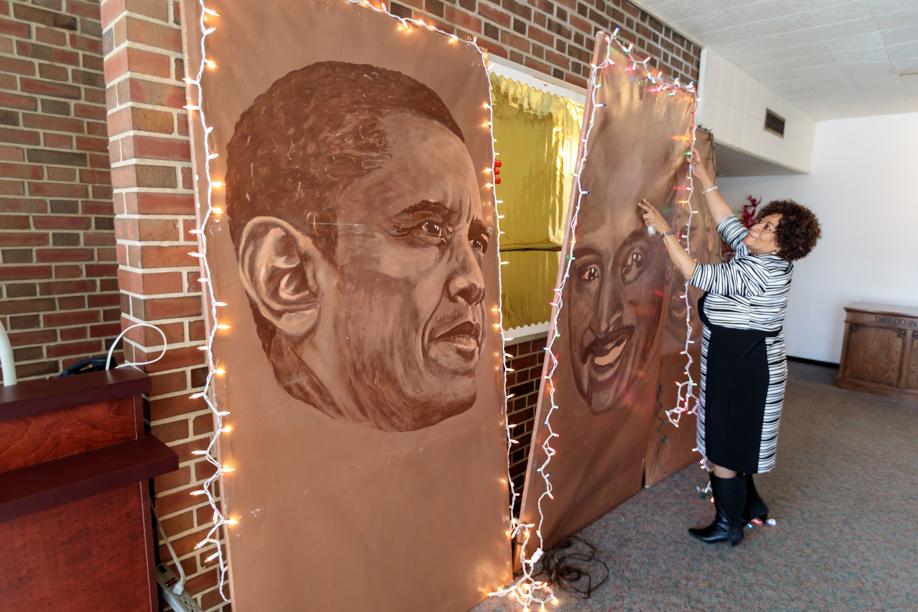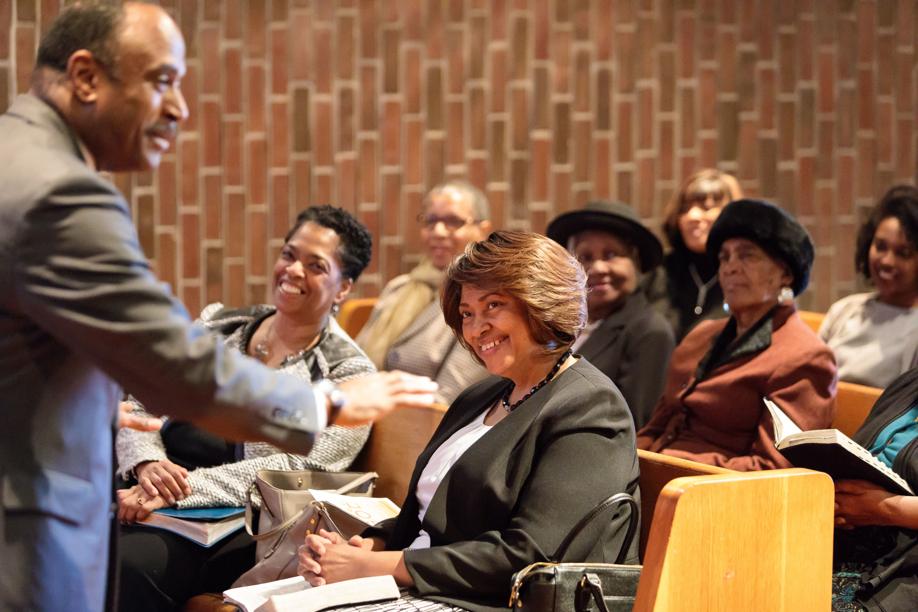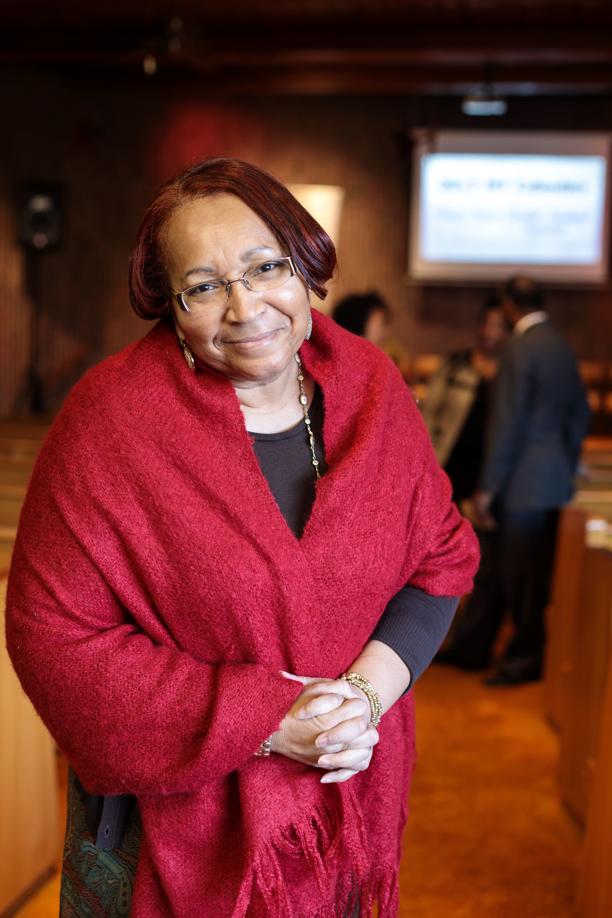


FLOSSMOOR, Ill. — Like the ubiquitous New England tributes to John F. Kennedy or the pope, portraits of Barack Obama are often found on the living room walls of black households near Chicago.
At the home of Felicia and Alonzo Perkins, the requisite Obama picture, a commemorative cover from Ebony magazine, is prominently mounted near the home’s entrance. Depending on the day, there are at least four Michelle Obama figurines on display, including a specially made FLOTUS wedding doll.
And there’s video, too, a grainy VHS tape from a special event held two weeks after Obama was first inaugurated in 2009. The Perkinses donned their Sunday best, drove 15 minutes to their church, and attended a makeshift “inaugural ball’’ for God-fearing Obama fans, almost all of whom were black and who wanted to celebrate the historic occasion but could not afford to travel to Washington.
“It was emotional because you knew there were people who never thought they’d live to see that day,’’ said Felicia Perkins, a retired teacher. “I never thought I’d live to see that day.’’
A teenager at the time, I was at that “inaugural ball,’’ which was held in the basement of Hallelujah Temple, a Pentecostal church in suburban Chicago that was founded by my father, the Rev. Dr. Astead N. Herndon. Other churches in Greater Chicago also held celebrations, including Inauguration Day watch parties and prayer services for the Obama family.
Eight years ago, the jubilation I saw among family and friends felt like the dawn of a racially progressive era.
Now, as America prepares for the inauguration of President-elect Donald Trump, whose divisive campaign often felt like a repudiation of Obama’s inclusive promise, I returned to my home, and that same Chicagoland church, to ask a simple question: “What now?’’
In January 2009, the party seemed like it would last forever. People clinked champagne glasses (nonalcoholic, of course), and toasted to the American democratic experiment, which finally seemed to work for those long excluded from the process.
Friends came over to our house for Obama’s inaugural speech. My sisters and I were allowed to skip school to watch the ceremony from the comfort of our living room. I wore a suit generally reserved for Easter Sunday.
“We wanted you all to be a part of history,’’ said my mother, Myrna Herndon.
At our church ball, I remember tuxedos on church elders and dashikis on family friends, the fur coats on aunts and satin gloves on cousins. Three murals were created to decorate the stage, one depicting Martin Luther King Jr.; another for my father; and a third for Obama.
After the program began, the words to the old civil rights song “We Shall Overcome’’ were changed by the program’s emcee. “We Have Overcome!’’ we sang.
“We have come through so much. Slavery, the civil rights movement, but now we’ve risen to this historic moment,’’ said one presenter during the celebration. “We’ve risen with President Barack Obama.’’
Obama echoed this sentiment during his emotional farewell speech in Chicago on Tuesday night, when he declared to the audience, “Yes, we did’’ achieve lasting progress.
Did we?
When I interviewed the same church members who had expressed such joy, I found they are genuinely fearful that the country has slipped back — that maybe Obama’s presidency was not the permanent advance some assumed it was in 2009.
Church members said they now felt aghast, angry, and uncertain at the prospect of a Trump presidency. Some, who characterized Trump’s rise as a “white-lash’’ against Obama, expressed worry about a looming race war, analogous to the 1960s American South. Others, especially seniors, said they were preparing to save more money, in case of financial collapse.
“Get your mind right,’’ said Alonzo Perkins, Felicia’s husband who works in insurance. “We’re a divided country. We’re as divided now as we were in the Civil War.’’
Many parishioners expressed a similar fear of division, saying they thought Trump had not shown an ability to empathize with black communities. They expressed disillusionment, wariness.
Arthur Hudson, an elderly church deacon who still remembers the segregated public spaces of his hometown in Western Illinois, Macomb, said he finds Trump personally offensive.
In his opinion, Trump — a man who may not have paid federal income taxes for decades, was sued for housing discrimination against blacks, bragged about assaultive behavior toward women, and mocked a disabled reporter — was not just unfit for the office, he was unworthy.
“He sees himself as above us,’’ Hudson said.
Felicia Perkins said Trump has consistently broken the American rules of decorum and decency.
“The presidency has gone to the dogs,’’ she said.
In 2008 and 2009, as Obama dazzled the country with his promises of a “more perfect union,’’ these were the people who dared to believe. Years of disenfranchisement had conditioned them to doubt (the doubt was so pervasive that many in my community feared Obama would be assassinated at his inauguration and that the Secret Service could not be trusted to protect him).
But most of all, I remember the hope, the emerging belief among black Americans that a lasting foothold in the nation’s political system might finally have been established.
“I really thought he was going to do it all, change everything,’’ said Lee Donna Hudson, Arthur’s 82-year-old wife. “I thought white people would begin to see [black people] in a different light.’’
On Tuesday, when Obama returned to Chicago to deliver his final presidential address, he said such talk of a post-racial America was “never realistic,’’ but at the time of his first election, he did little to temper such expectations.
Even in the last gasps of the Obama era, the speech attempted to foster a togetherness among the racially diverse crowd.
From the singing of the national anthem by BJ the Chicago Kid, a hip-hop artist, the night was less of a political rally and more of a homecoming for the city’s greatest political son.
“I first came to Chicago when I was in my early 20s, and I was still trying to figure out who I was, still searching for a purpose to my life,’’ Obama told the crowd, who began chanting “Four more years!’’
“It was on these streets where I witnessed the power of faith and the quiet dignity of working people in the face of struggle and loss,’’ he said.
While he spoke, I thought of my family. For more than seven years following Obama’s inaugural speech, my sisters and I were barred from removing the recording of the inauguration from our family’s DVR. This was not because of some undying love for the policies of the Obama administration or even Obama himself, but because the existence of his presidency, among some black people, felt like a communitywide accomplishment.
One major reason for that feeling, according to Sylvia Doss, a church member and one of the lead organizers of the 2009 ball, was because of the way the first family conducted themselves in the public eye.
The president ended two terms without a major personal scandal, just as hopeful and energetic as he entered, Doss said. More importantly, for a community used to being mischaracterized, the Obama family remained a national role model, a ready-made counterpoint to the stereotypes of black people as bad parents and worse citizens.
“He made us proud,’’ Doss said. “Here was a black man, who had to take everything that white America was throwing at him, but he always kept and maintained his dignity.’’
But this connection, and the nostalgia that comes with it, is also what makes the looming Trump presidency sting the congregants even more.
Myrna Herndon said she thought the differences between the Trump and Obama administrations were an example of an old adage among black people, that “we have to be twice as good to get just as much.’’
She and others at the church said they have struggled to interact with white people since Trump’s victory. In contrast to the ecstasy following Obama’s first election, when she was busy planning the church’s upcoming celebration, my mother said she felt that America had taken a stance against her humanity as a woman and black person.
“I had anger,’’ she said, adding that to her, as a woman and an African-American, “Donald Trump was particularly offensive. And the day after the election, when I realized that so many people discounted that and voted for him, there was anger in me that I had to work through.’’
As for my father, the pastor who came up with the idea for the inaugural ball, his faith remains steadfast. Last Sunday, he preached about remaining hopeful in times of despair, through all political and cultural fluctuations.
With his usual showmanship and humor, he challenged the congregation to express their values as social-justice-minded Christians and to prod others in their social circles to make sure they’re doing the same. The entire message was a thinly veiled reminder that no matter who is president, Trump or Obama, the work of improving yourself and your community must continue.
“It’s still hard for me to watch Donald Trump speak,’’ Pastor Herndon said later. “He embodies a lot of values that I don’t have. But I’m praying, though, for him and the country.’’
That same Sunday, Herndon announced plans for a special service to honor the legacy of President Obama and his family on Martin Luther King Jr. Day.
There will be no inaugural ball for President Donald Trump.
Astead W. Herndon can be reached at astead.herndon@globe.com. Follow him on Twitter @AsteadWH.



